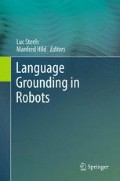Abstract
Russian requires speakers of the language to conceptualize events using temporal language devices such as Aktionsarten and aspect, which relate to particular profiles and characteristics of events such as whether the event just started, whether it is ongoing or it is a repeated event. This chapter explores how such temporal features of events can be processed and learned by robots through grounded situated interactions. We use a whole systems approach, tightly integrating perception, conceptualization grammatical processing and learning and demonstrate how a system of Aktionsarten can be acquired.
Access this chapter
Tax calculation will be finalised at checkout
Purchases are for personal use only
Preview
Unable to display preview. Download preview PDF.
References
Allen JF (1983) Maintaining knowledge about temporal intervals. Commun ACM 26(11):832–843
Bickel B (1996) Aspect, mood, and time in Belhare: studies in the semantics – pragmatics interface of a Himalayan language. Zurich: ASAS-Verlag
De Beule J (2006) Simulating the syntax and semantics of linguistic constructions about time. In: Gontier N, van Bendegem JP, Aerts D (eds) Evolutionary Epistemology, Language and Culture - A non-adaptationist, systems theoretical approach, Springer
Forsyth J (1970) A Grammar of Aspect: Usage and Meaning in the Russian Verb. Cambridge: Cambridge University Press
Gagarina N (2000) The acquisition of aspectuality by Russian children: the early stages. ZAS Papers in Linguistics 15:232–246 Gerasymova K (2010) Emergence of aktionsarten: The first step towards aspect. In: Smith A, Schouwstra M, de Boer B, Smith K (eds) The Evolution of Language (Evolang8), World Scientific, Singapore, pp 145–152
Gerasymova K, SprangerM(2010) Acquisition of grammar in autonomous artificial systems. In: Coelho H, Studer R, Woolridge M (eds) Proceedings of the 19th European Conference on Artificial Intelligence (ECAI-2010), IOS Press, pp 923– 928
Gerasymova K, Steels L, van Trijp R (2009) Aspectual morphology of russian verbs in fluid construction grammar. In: Taatgen N, van Rijn H (eds) Proceedings of the 31th Annual Conference of the Cognitive Science Society, Cognitive Science Society, pp 1370–1375
Krongauz MA (1998) Pristavki i glagoly v russkom jazyke: semantiˇceskaja grammatika. Moscow: Jazyki russkoj kul’tury
Lieven E, Behrens H, Speares J, Tomasello M (2003) Early syntactic creativity: A usage-based approach. Journal of Child Language 30(02):333–370
Spranger M, Pauw S, Loetzsch M, Steels L (2012) Open-ended Procedural Semantics. In: Steels L, Hild M (eds) Language Grounding in Robots, Springer, New York
Steels L (1995) A self-organizing spatial vocabulary. Artificial Life 2(3):319–332
Steels L, Baillie JC (2003) Shared grounding of event descriptions by autonomous robots. Robotics and Autonomous Systems 43(2-3):163–173
Steels L, De Beule J, Wellens P (2012) Fluid Construction Grammar on Real Robots. In: Steels L, Hild M (eds) Language Grounding in Robots, Springer, New York
Stoll S (1998) The role of aktionsart in the acquisition of Russian aspect. First Language 18(54):351–376
Tomasello M (1995) Joint attention as social cognition. In: Moore C, Dunham PJ (eds) Joint attention: Its origins and role in development, Lawrence Erlbaum Associates, Hillsdale, NJ, pp 103–130
Tomasello M (2000) First steps toward a usage-based theory of language acquisition. Cognitive Linguistics 11-1/2:61–82
Author information
Authors and Affiliations
Corresponding author
Editor information
Editors and Affiliations
Rights and permissions
Copyright information
© 2012 Springer Science+Business Media, LLC
About this chapter
Cite this chapter
Gerasymova, K., Spranger, M. (2012). An Experiment in Temporal Language Learning. In: Steels, L., Hild, M. (eds) Language Grounding in Robots. Springer, Boston, MA. https://doi.org/10.1007/978-1-4614-3064-3_12
Download citation
DOI: https://doi.org/10.1007/978-1-4614-3064-3_12
Published:
Publisher Name: Springer, Boston, MA
Print ISBN: 978-1-4614-3063-6
Online ISBN: 978-1-4614-3064-3
eBook Packages: Computer ScienceComputer Science (R0)

